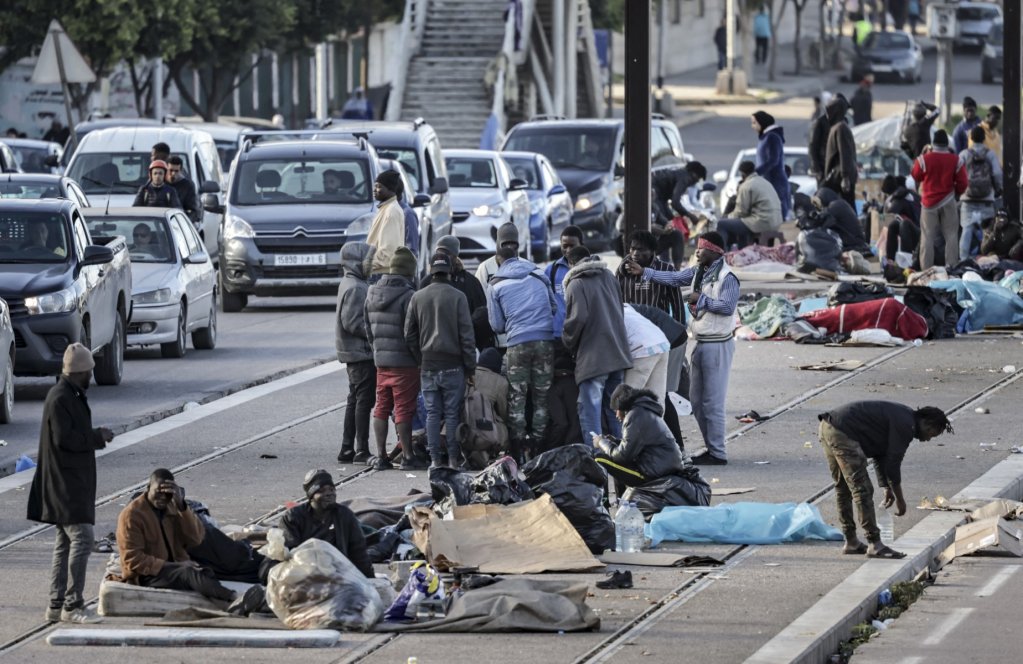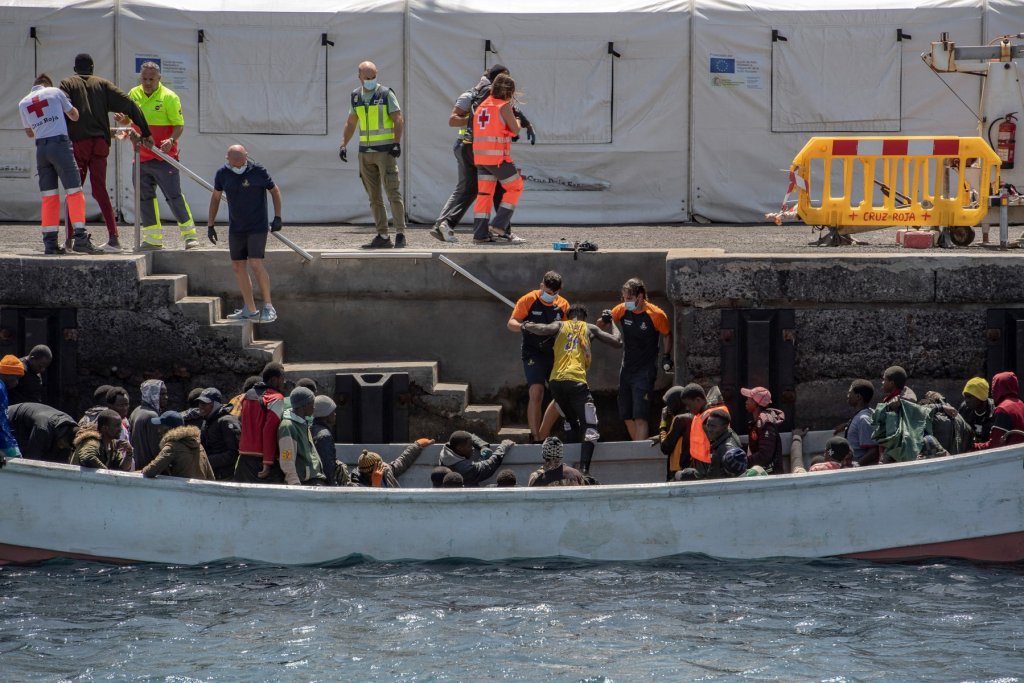Boubacar (name changed) fled community violence in Mali to seek refuge in neighboring Senegal. Fearing that the violence would spread beyond his country, he set off for Morocco a few years later. The racist assaults and attacks he says he suffered there then drove the 22-year-old Malian to reach the Canary Islands by sea earlier this year. Now in Tarragona on the mainland, he anxiously awaits a response to his asylum application. Here is his story.
Boubacar, a 22-year-old Malian, reached the Spanish island of Lanzarote earlier this year aboard a rubber dinghy from the Moroccan coast. The young man had traveled all the way from Mali, via Senegal.
"In my village in Mali, there has been violence between communities for centuries due to the caste system. The servant caste, to which my family belongs, must serve and work for the noble caste. To this day, there are revolts against this slavery. Because of these conflicts, I left the village around the age of 12, to be safe. All these problems also prevent the education of young people there.
Although illegal in Mali, the caste system -- which governs and defines social roles -- persists and generates stigma, violence, rights violations, and even causes deaths. The young boy, of Mandingo ethnicity, lived for eight years in Senegal, a country bordering Mali, with his uncle, to avoid the recurring violence in his village. In 2023, as a young adult, he took the bus back to Mali, eager to be reunited with his father, brother, and sister.
When I returned at the end of 2023 -- beginning in 2024, I discovered that my brother had fled the country because he was being threatened and wanted by the family of the girl he had fallen in love with. In the village, you can't marry someone who isn't of your caste. I was afraid of reprisals against our family and myself, so I preferred to leave. Since Senegal is very close to my village, I was afraid they would find me. I wanted to run far away."
'They strip us of our money and of all our belongings'
Boubacar took a bus from Senegal to Morocco with the pocket money given to him by his uncle. In the summer of 2024, he settled in the town of Tan-Tan, in southern Morocco. Many Africans work in the fields there.
I worked for seven months harvesting raspberries, tomatoes, and zucchini. We were poorly paid, less than Moroccans.
I rented a room with five other Malians. There wasn't much space, but we were brothers. The landlord constantly demanded money from us for so-called utilities, with fake water bills of 700 dirhams [66 euros, editor's note]. If you refused, they evicted you from the apartment.
We suffered a lot of attacks from the Moroccans. They robbed us of our money, our phones. They took all our belongings. I slept badly because I was scared; I didn't dare go out. Even at work, there were attacks. They are very racist, even though we are all African.

I wanted to stay in Morocco, but because of all these difficulties and racism, I decided to go to Spain. I knew little about that country; I knew it was in Europe and that human rights were respected there. There, you're safe even when you don't have a job or money. Everyone wants a better life, and above all, safety.
'All we wanted was to leave the Atlantic'
Smugglers are easy to find: they're on the beach, at the boat departure points. I paid 2,000 dirhams [189 euros, editor's note] for the crossing to Lanzarote, in the Canary Islands. I'd never heard of this place; I just wanted to go to Spain. The smugglers meet you once you've paid, and you leave the next day, during the night.
They put the boat in the water and push it, then you have to jump in, but you don't see anything. I remember the sound of the waves crashing against the dinghy. I was very scared, but I calmed down afterward. I vomited a lot during the crossing; many of us were seasick. I also had a headache, and I remember being very cold. There was no food: I had to leave the bag with some cakes I had made. The only 5-liter water bottle was quickly finished; some didn't even drink during the trip.
About 65 people were on the dinghy Boubacar had boarded. The passengers were mainly Senegalese, Malian, and Guinean. Mostly fathers and young adults, but also three women. Boubacar claims he was the youngest. According to him, the crossing lasted two days.
During the crossing, water started to get into the boat. We panicked; most of the passengers at this point wanted to turn around and go back. All we wanted was to get out of the Atlantic. A few fathers managed to calm everyone down and keep the dinghy afloat. There were large boats in the distance, but we couldn't reach them. When we ran out of gas at 5 am, we let the waves push our boat adrift.
Boubacar and his unfortunate companions were rescued a few hours later, 80 kilometers off the coast of the Canary Islands. The passengers finally disembarked on the island of Lanzarote around 12 p.m. on January 5, 2025.
'I was very tired and shocked'
When we arrived on the island, the Red Cross took care of us: we were given clothes and shoes, and we were examined and registered. We all had a fever from the blazing sun, and several of us fainted upon arrival. I was very, very thirsty.
I stayed in a center for three days. I couldn't eat; I only drank juice because I was very tired and shaken by the crossing.
I was then transferred to the center in Alcalá de Henares, in Madrid.
Boubacar stayed there for four months, from January 8th to April 15th. That's when he filed his asylum application, on the grounds of persecution in his native country. Three months after his arrival in Spain, his application was finally registered. He's now waiting for a response to his application.
At the appointment for my application, I simply explained my journey and what I'd experienced. I was reassured by the presence of an interpreter. The process is long, but you have to go through it for them to accept your presence in the country. It's the system.

My father learned of my arrival in Spain from someone who had seen a photo on WhatsApp. I called him, but due to bad reception, I wasn't able to speak to him until three or four days later. He was worried, asking me if I had food, if I had a place to live, what problems I had encountered... He was worried, and I reassured him. We had never discussed migration as a family before, and I hadn't told anyone about my departure.
His brother, who is three years older than him, also left for Spain after fleeing Mali. Boubacar learned of this while in Morocco. He arrived by boat in Las Palmas, in the Canary Islands, and is now in Zaragoza, in northern Spain.
'Very long days'
The young Malian was then moved to a hotel run by the Red Cross in Tarragona, in northeastern Spain. Around a hundred other migrants—Venezuelans, Senegalese, Mauritanians, and others—also reside there. The organization provides housing, meals, and administrative assistance for asylum applications or subsidiary protection. Boubacar lives with five Malians.
I feel comfortable; we can talk easily. We talk about the difficulties we encountered along the way, the fear we felt during the crossing, and the suffering we experienced. But we never talk about the reasons for leaving; we don't want to get involved in other people's stories. I'm the youngest, so they support me, give me advice, and sometimes they try to comfort me by telling me to be patient.
The days are very long: there's nothing to do because the center is just for eating and sleeping. If only we had clothes, we could do some exercise, but there aren't any. I get up in the morning to have lunch, then I go into town for a little walk, and then I come back home. We're allowed to go out, so we go for walks in the city center or to the beach, which aren't very far. None of us wants to swim at the beach; we were traumatized by the sea during the crossing. We just watch the waves and take pictures.
The city is beautiful; I like its architecture, the spaces there to play, and the public squares. I feel somewhat integrated; in any case, I'm not afraid to go out like I am in Morocco. I feel good and I feel welcomed.
A few weeks ago, I started taking Spanish lessons: it's very interesting and useful because I want to stay in Spain. We're here, so we need to speak the local language to be able to integrate quickly.
Sometimes I'm stressed about the response to my asylum application. I try to think about something else, but since I'm not doing much, I think a lot about how things are going to go, if I'll get help... It's complicated. My mind isn't at ease. But I keep hoping, and when my spirits are low, I tell myself I have to be patient.
I'd like to train as a welder. Later, I'd like to become a Spanish citizen and live in Spain like I do at home. What I like most here is that people are listened to, that they aren't judged by their skin color or ethnicity, but rather by their behavior.
